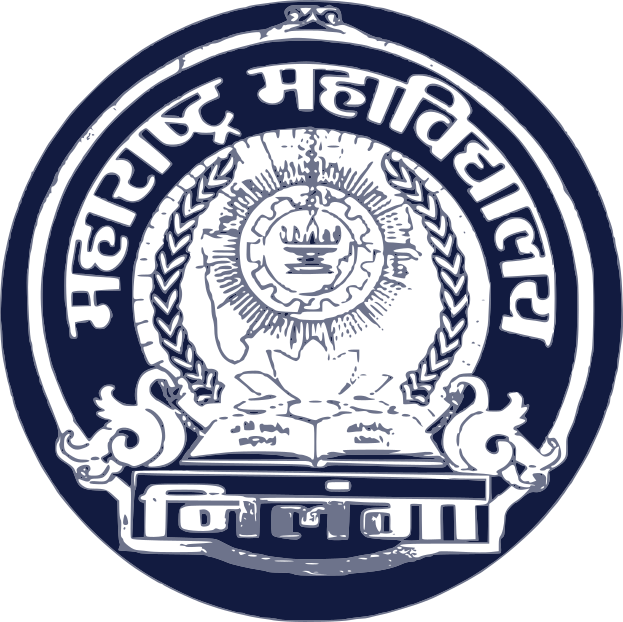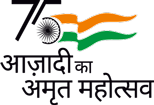DEPARTMENT OF ECONOMICS
- About the Department
The Department of Economics in Maharashtra College was established in the year 1970. Since its inception, Professor G.B. Kulkarni and Professor Subhash Ravale sir were working in the Department of Economics. Now in the present situation Professor Dr. S. S. Devnalkar and Miss Prithvi Fawde are working. Datta Pawar, Sugandha Jagtap, Sheikh Samina, Rautrao Mahadevi, students of Economics Department of Maharashtra College from Swami Ramanand Tirth Marathwada University are the first students to come from the university. The Kailasavashi PadmaShri Sambhajiraoji Kadam award given by the Mhaisekar Amrut Mahotsav Committee was awarded. So far, two national seminars were organized on behalf of the Department of Economics on 14 and 15 January 2014 and 29 December 2022 this year. Many activities are undertaken for the overall development of students under the Department of Economics.
- Faculty
| Sr. NO. | NAME OF THE FACULY | DESIGNATION | DATE OF JOINING | EXPERIENCE | C.V. | Photo |
| 1 | DR. S.S. DEVNALKAR | PROFESSOR | 31/01/2007 | 17 | D S S | 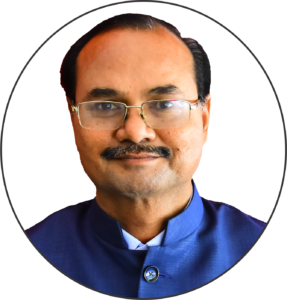 |
| 2 | MISS. P.B. PHAWADE | ASST.PROF. | 25/06/2022 | 02 | C.V PBP |
- PROGRAMMES OFFERED
| Sr. No. | NAME OF THE PROGRAMME | IN-TAKE CAPACITY | DURATION | PROGRAMME OUTCOMES |
| 1. | B. A. F. Y ECONOMICS
[ I & II SEMISTER ] |
120 | 3 YEARS |
MICRO ECONOMI-I STATISTICAL METHODS-II MICRO ECONOMICS-III STATISTICAL METHODS-IV |
| 2.
3. |
B.A. S. Y. ECONOMICS
[ III & IV SEMISTER ]
B.A.T.Y. ECONOMICS [ V &VII SEMISTER ] |
40
42 |
2 YEARS
1 YEARS |
MACRO ECONOMICS-V QUANTITATIVE TECHQUANICS-VI CASHLESS TRANSACTION[SEC-I] MACRO ECONOMICS-VII QUANTITATIVE TECHQUANICS-VIII DATA COLLECTION [SEC-II ] HISTORY OF ECONOMIC THOUGHTS-IX INDIAN ECONOMY-X FINANCIAL INCLUSION AND FINANCIAL LITERACY [SEC-III ] HISTORY OF ECONOMIC THOUGHTS-XI PUBLIC FINANCE-XII ENTREPRENEUSHIP DEVLOMENT-IV |
- Offered Courses
| Year | Semester | Titles of the Courses | Course Outcomes |
| B. A. I | I | 1.Micro Economics | i) Meaning, nature and scope will be studied in this course.
ii) Student’s ability will be utilized to tackle the current economic problems. iii) Students will adept more knowledge in the field of modern economics by studying this course. iv) This course will increase the utility and application to acquire more satisfaction in life. |
| 2.Statistical Methods | 1. Students will prepare themselves to understand the statistical methods.
2. Interest among the students to learn technical papers like Statistics, Quantitative Technique, Mathematical Economics and Econometrics will be created. 3. Understanding of the basic concepts of data interpretation with the help of Statistics will be generated. 4. Students will able to understand basic statistical tools of data analysis. 5. This course is useful for the students to get job where the data analysis is comprehensively used. |
||
| II | 3.Micro Economics
|
i) Student will get the knowledge about Production, Cost and Revenue.
ii) Students will be acquainted with the various markets from the point of view of competition. iii) This course will be helpful to realize the actual market through competitive point of view. iv) The acquisition of knowledge about providing share of different factors of production. |
|
| 4. Statistical Methods | 1. The students understand the statistical methods.
2. Interest among the students to learn technical papers like Statistics, Quantitative Technique, Mathematical Economics and Econometrics will be generated. 3. Understanding of the basic concepts of data interpretation with the help of statistics will be facilitated. 4. Students will be able to understand the basic statistical tools of data analysis. 5. This course is useful for the students to get job where the data analysis is widely used. |
||
| 5.Macro Economics | This course aims to develop the broad conceptual frameworks, which will enable students to understand and comment upon real economic issues like inflation, money supply, GDP and their interlinkages | ||
| IV | 6. Quantitative Techniques | The course is helpful to study other branches of economics and research. The course will be useful for the students to understand data analysis, estimation and inference since the course is best on the techniques of statistics. | |
| 7. Macro Economics | This course aims to develop the broad conceptual frameworks, which will enable students to understand and comment upon real economic issues like employment and multiplier, acceleration, banking system, open economy, and their interlinkages. It will also allow the students to evaluate various macroeconomic policies in terms of a coherent logical structure. | ||
| 8. Quantitative Techniques | 1. Students will get knowledge about how the value of money is decided.
2. Students will study price differentiation between base year and current year. 3. Students will study the change in economic factors in course of times. 4. Students will study the economic & social trend with the help of moving average method. |
||
|
V |
9. HISTORY OF ECONOMIC THOUGHTS | 1. Pupils will understand the basic economic concepts by studying the course.
2. Students will be able to solve the economic problems by studying this course. 3. Students will acquire the judgment power by studying the comparative approach. |
|
| 10. INDIAN ECONOMY. | 1. Student will acquire the knowledge of Indian Economy.
2. Student will understand various challenges of Indian Economy. 3. Student will be able to suggest various measures to policy makers for solution of economic problem.
|
||
| VI | 11. HISTORY OF ECONOMIC THOUGHTS | 1. Agricultural Entrepreneurship will be adopted by pupils.
2. Students will get knowledge of the exploitation of Indian Economy in the British rule. 3. Students will know how much the political Leadership is successful in solving the economic problems of the society. 4. The students will know the importance of Eastern Economic Ideas on the world level. |
|
| 12. PUBLIC FINANCE | 1. Student will able to analyze different concept of public finance.
2. The student will understand the imbalance between public revenue and public expenditure. 3. The students will suggest various measures to decrease deficit. 4. The student will be able to evaluate working of recent finance commission. |
||
| 13. ENTREPRENEURSHIP DEVELOPMENT- SEC-IV | 1. Understand the concept of entrepreneurship and its functions. The student will also be able to describe the process of entrepreneurship.
2. Explain the competencies of an entrepreneur. 3. Understand the meaning and ways of generating ideas and able to prepare a business plan. 4.Understand the reasons for success and failure of a business plan. 5. Identify the various support structure available for promoting entrepreneurship |
- Results
| Sr. No. | Academic Year | No. of Students Enrolled | No. of Students Appeared for Exam | Passed | Failed | Percentage of Result |
| 1. | 2018-19 | 35 | 33 | 33 | 00 | 100% |
| 2. | 2019-20 | 32 | 32 | 31 | 01 | 96.87% |
| 3. | 2020-21 | 40 | 39 | 39 | NIL | 100% |
| 4. | 2021-22 | 35 | 34 | 32 | 02 | 94.11% |
| 5. | 2022-23 | 34 | 29 | 29 | NIL | 100% |
| 6. | 2023-24 | 28 | 21 |
- University Merit
| Sr. No | Academic year | Name of the student’s | Percentage | University merit |
| 1 | 2015-16 | Datta Pawar | 88.50 | Ist |
| 2 | 2018-19 | Sugandha Jagtap | 89.00 | Ist |
| 3 | 2020-21 | Shaikh Samina | 92.33 | Ist |
| 4 | 2021-22 | Rautrao Mahadevi | 89.33 | Ist |
- Student’s Achievements/ Merit
| Sr. No. | Academic Year | Name of the Student | % or Award or Achievement |
| 1 | 2018-19 | 1. | |
| 2. | |||
| 3. | |||
| 2 | 2019-20 | 1.SOMEANSHI SHRADHA T. | 89.00 % |
| 2. SWAMI SHITAL G. | 84.00 % | ||
| 3. KSHIRSAGAR SUBHADRA Y. | 83.66 % | ||
| 4. SAUDAGAR SABARIN A. | 83.33 % | ||
| 5. DESHMUKH NASEER J. | 83.33 % | ||
| 3 | 2020-21 | 1.JADHAV KIRTI N. | 92.66 % |
| 2. SHAIKH SAMINA H. | 92.33 % | ||
| 3.VIHIRE AAU P. | 91.66 % | ||
| 4. INAMDAR AMARANI S. | 91.00 % | ||
| 5. JADHAV SUJATA D. | 91.00 % | ||
| 4 | 2021-22 | 1.SHIRURE YOGITA S. | 91.33 % |
| 2. TAPPEWALE SUMMAYA Y. | 91.33 % | ||
| 3. SHAIKH SAFURA S. | 90.33 % | ||
| 4. TODAKAR VAISHNAVI S. | 90.00 % | ||
| 5. RAUTRAO MAHADEVI R. | 89.33 % | ||
| 5 | 2022-23 | 1. BELKUNDE SUSHMA K. | 90.33 % |
| 2. KAMBALE ADESH K. | 89.33 % | ||
| 3. PATIL VAISHNAVI R. | 87.66 % | ||
| 4. CHATRIKAR NANDINI A. | 84.33 % | ||
| 5. SHAIKH SAKIL J. | 84.00 % | ||
| 6 | 2023-24 | 1. | |
| 2. | |||
| 3. | |||
| 4. |
- Best Practices of the Department
| Sr. No | Title of the Best Practice | Photos |
| 1 |
ADD ON CERTIFICATE COURSE -EXAM TEST |
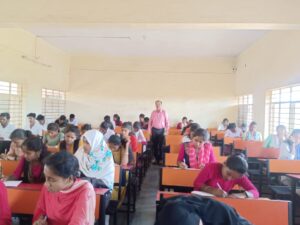 |
| 2 |
ECONOMICS POSTER PRASENTETION
|
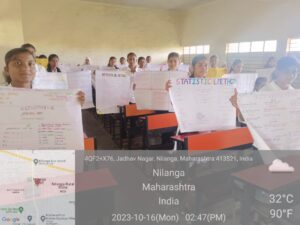 |
| 3 | STUDENTS
SEMINAR |
 |
|
4
|
ECONOMICS UNIVERSITY MERIT FUNCTOIN |
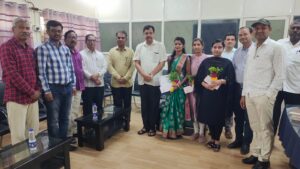 |
| 5 | NATIONAL
CONFERENCE |
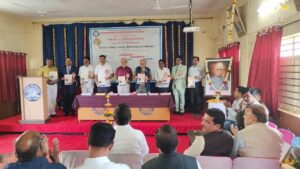 |
Department Activities’
| Sr.No | Activity | Name of Teacher | Link |
| 1 | ICT class | Dr.Devnalkar S S | ICT Basead Clases Dr.S.S.Devnalkar |
| 2 | Guest Lecture | Dr.Dande Sadhashiv | ECO GUIST LECTURE |
| 3 | Poster Presentation | Dr.Devnalkar S S | Economics_Activities_file[1] |
| 4 | Economic Knowledge Test &
Green Club Associations |
Dr.Devnalkar S S | Economics_Activities_file[1] |
- Notable Alumni
| Sr. No. | Name of the Alumni | Present Designation |
| 1. | Prof. Dhanraj Birajdar | Professor at Rasika Mahividyalay, Deoni |
| 2. | Prof. Datta Pawar | Professor at Maharashtra Mahavidyalaya, Nilanga |
| 3. | Satish Jadhav | Mumbai Police |
| 4. | Siddeshwar Jadhav | Mumbai Police |
| 5. | Atul Chavan | Bussinessman |
